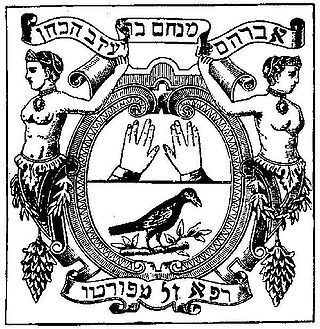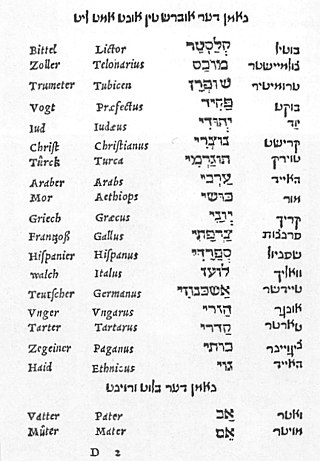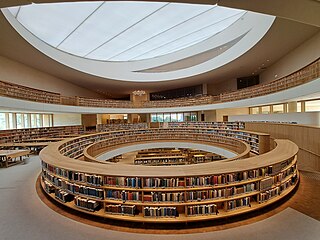Related Research Articles

Rabbinic literature, in its broadest sense, is the entire spectrum of rabbinic writings throughout Jewish history. However, the term often refers specifically to literature from the Talmudic era, as opposed to medieval and modern rabbinic writing, and thus corresponds with the Hebrew term Sifrut Chazal. This more specific sense of "Rabbinic literature"—referring to the Talmudim, Midrash, and related writings, but hardly ever to later texts—is how the term is generally intended when used in contemporary academic writing. The terms mefareshim and parshanim (commentaries/commentators) almost always refer to later, post-Talmudic writers of rabbinic glosses on Biblical and Talmudic texts.

Isaiah or Yeshayahu ben Avraham Ha-Levi Horowitz, , also known as the Shelah HaKaddosh after the title of his best-known work, was a prominent rabbi and mystic.

The Dinstagishe un Fraytagishe Kuranten was the earliest known Yiddish-language periodical, founded by Uri Phoebus Halevi. It was a semi-weekly founded in Amsterdam in 1686, that was published on Tuesdays (Dinstag) and Fridays (Fraytag) and it lasted for little over one year. It covered local news and news from other Jewish communities, including those as far away as India. Issues of the paper were discovered in 1902 by the librarian David Montezinos.

The Rappaport family is a prominent Kohanic rabbinic family, who are generally considered to possess the oldest and best recorded Kohanic pedigree. The modern origins of the family can be traced back to R. Meshulam Jekuthiel HaKohen Rappa who settled in Porto, Mantua, Italy after the Jews were expelled from his hometown of Mainz, Holy Roman Empire. From the 17th century and onward, the Rappaport family occupied some of the most prestigious rabbinic positions in Europe, specifically in Eastern Europe. The Rapoport-Bick rabbinic dynasty is a branch of the Rappaport family.

Josippon is a chronicle of Jewish history from Adam to the age of Titus. It is named after its supposed author, Flavius Josephus, though it was actually composed in the 10th century in Southern Italy. The Ethiopic version of Josippon is recognized as canonical by the Ethiopian Orthodox Tewahedo Church and the Eritrean Orthodox Tewahedo Church.

Micah Joseph Lebensohn (Hebrew: מיכה יוסף הכהן לעבענזאָהן, romanized: Mikhah Yosef ha-Kohen Lebenzohn;, also known by the pen name Mikhal, was one of the foremost poets and translators of the Haskalah in Vilna. He is best known for his innovative narrative Biblical romances and pantheistic nature poetry, influenced by the Romantic movement. These are characterised by "a deep pathos and a beauty of expression," and noted for their "expression of the young poet's strong longing for life and of the dread of an early dissolution which preyed on his mind."

Jewish literature includes works written by Jews on Jewish themes, literary works written in Jewish languages on various themes, and literary works in any language written by Jewish writers. Ancient Jewish literature includes Biblical literature and rabbinic literature. Medieval Jewish literature includes not only rabbinic literature but also ethical literature, philosophical literature, mystical literature, various other forms of prose including history and fiction, and various forms of poetry of both religious and secular varieties. The production of Jewish literature has flowered with the modern emergence of secular Jewish culture. Modern Jewish literature has included Yiddish literature, Judeo-Tat literature, Ladino literature, Hebrew literature, and Jewish American literature.
Abraham ben Reuben Trebitsch was an Austrian Jewish scholar.

In the early part of the sixteenth century, there were already attempts to translate the Bible into Yiddish, including Hebrew-Yiddish biblical dictionaries. One of the most authoritative was the Bible that Jekuthiel Blitz translated in 1678.

Solomon Zalman ben Judah Loeb ha-Kohen Hanau (later known by the acronym Raza"h or Zalman Hanau or Zalman Henna, was a German Jewish expert in Hebrew grammar and critical textual critic of Jewish liturgy and prayer nussach.
Shimon Akiva Baer ben Yosef of Vienna was a 17th-century Viennese Talmudist and kabbalistic writer.
Dom Jacob Curiel, known by his alias DomDuarte Nunes da Costa, was a Sephardi Jewish merchant, diplomat, and nobleman.
Don David Curiel, alias Lopo da Fonseca Ramires, was a Sephardi Jewish merchant.
Abraham Curiel (1545-1609), alias Jeronimo Nunes Ramires, was a physician and the son of the wealthy merchant Jacob Curiel of Coimbra of Coimbra. Curiel is described in several sources as "one of the greatest doctors of his time."

Judah Leib Ben-Ze'ev was a Galician Jewish philologist, lexicographer, and Biblical scholar. He was a member of the Me'assefim group of Hebrew writers, and a "forceful proponent of revitalizing the Hebrew language".
Berish Blumenfeld was a Galician Jewish Hebraist.

Modern Jewish historiography is the scholarly analysis of Jewish history into the modern era. While Jewish oral history and the collection of commentaries in the Midrash and Talmud are ancient, with the rise of the printing press and movable type in the early modern period, Jewish histories and early editions of the Torah/Tanakh were published which dealt with the history of the Jewish religion, and increasingly, national histories of the Jews, Jewish peoplehood and identity. This was a move from a manuscript or scribal culture to a printing culture. Jewish historians wrote accounts of their collective experiences, but also increasingly used history for political, cultural, and scientific or philosophical exploration. Writers drew upon a corpus of culturally inherited text in seeking to construct a logical narrative to critique or advance the state of the art. Modern Jewish historiography intertwines with intellectual movements such as the European Renaissance and the Age of Enlightenment but drew upon earlier works in the Late Middle Ages and into diverse sources in antiquity.
References
- ↑ "Amelander (Amlander), Menahem Mann Ben Solomon Ha-Levi". www.jewishencyclopedia.com. Retrieved 2023-11-05.
- ↑ Wallet, Bart (2012-01-01). "Links in a Chain: Early Modern Yiddish Historiography in the Northern Netherlands (1743-1812)" (PDF). Universiteit van Amsterdam [thesis, fully internal].
- ↑ "menahem man ben salomo halevi und sein jiddisches geschichtswerk "sche'erit jisrael"". De Gruyter (in German). Retrieved 2023-11-06.
- ↑ Fuks-Mansfeld, R.G. (1981). "Yiddish Historiography in the Time of the Dutch Republic". Studia Rosenthaliana. 15 (1): 9–19. ISSN 0039-3347. JSTOR 41481882.
- ↑ "Hidden Polemic: Josephus's Work in the Historical Writings of Jacques Basnage and Menaḥem Amelander". Josephus in Modern Jewish Culture: 42. 2019.
- ↑ Smith, Mark L. (December 2021). "Two Views of Yiddish Culture in the Netherlands". Studia Rosenthaliana. 47 (2): 117–138. doi:10.5117/SR2021.2.002.SMIT (inactive 31 January 2024).
{{cite journal}}: CS1 maint: DOI inactive as of January 2024 (link) - ↑ Wallet, Bart (2007). "Ongoing History: The Successor Tradition in Early Modern Jewish Historiography". Studia Rosenthaliana. 40: 183–194. doi:10.2143/SR.40.0.2028843. ISSN 0039-3347. JSTOR 41482510.
- ↑ Zinberg, Israel (1975). Old Yiddish Literature from Its Origins to the Haskalah Period. KTAV Publishing House, Inc. ISBN 978-0-87068-465-4.